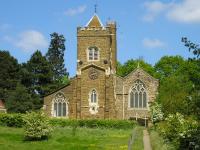Maulden
Maulden is a small village, in the county of Bedfordshire, in the administrative area of Mid Bedfordshire. The MP for the area is Nadine Dorries. It is located 1.5 miles east of Ampthill and approximately 8 miles south of Bedford. It has approximately 3500 residents. Recently, the amount of people in the village has increased rapidly with a new housing development by Croudace Homes which has brought 46 news houses to the village.[1].
We have a problem with sppeding traffic- and a village based group and charity- Safer Maulden was created- visit http://www.safermaulden.org.uk
There is an online petition- please visit ipetition and type in safermaulden in the search.
Maulden is referred to in the Domesday Book as Meldone and the meanings ascribed to the various versions of the name include ‘cross on the hill’, ‘high down’ and ‘place of meeting’.
Amenities
Maulden has a recently renovated branch of the Co-op which has a huge importance for the community. The town also includes a small Post Office. It has four pubs- The George, The White Hart, The Dog & Badger and The Black Horse. There is also two small industrial estates to the south east of the village. These are primarily agricultural, but also contain some light chemical instillations. The only youth facility in the village is a Recreation ground in the west of the village.
Church

Maulden is in the parish of St Marys the Virgin, Maulden. There is services every Sunday at 8.00am and 9.30, except on the 1st Sunday of the month which is a family service. The church has an active community, with a variety of different events taking place throughout the week. Over the next few months, it is pioneering recording technology with the weekly services being broadcast over the internet.
There is one Rectory for the Parish of St Marys the Virgin. The current incumbent is Rev. Richard Winslade. There is also a Baptist church.
The Church is due to be featured in a small independent film, set for release in late 2007, called 'Norman's Book'. The director, Edward Frizzelle, also lives in Maulden. Simon Jeffery, a former resident of Maulden, stars in the film.
History

In 1824 the church consisted of the tower, a nave with a very low roof (it was reported in the Bedford Mercury of October 1858 that during a heavy downpour it was difficult to hear the sermon), a chancel with a slightly higher roof, a north aisle and gallery. This gallery was quite large, and because of the low roof came down to only two feet above the tops of the pews underneath, as well as blocking the light from two of the windows. The pews, some of which faced different ways, provided seating for 248, plus 40 in the gallery. There was no south aisle and no vestry. There was a south entrance with a porch, and a doorway in the north wall, next to the passageway to the Ailesbury mausoleum.
One of the most remarkable features of the church is the De Grey Mausoleum (pictured). Very little is known about it, except that it is the final resting place of 10 generations of the De Grey family who lived in Maulden.
Census
The 1851 Census Index for Maulden can be found in the 1851 Index to Census of Bedfordshire, Volume 4, Book 2 available from the Bedfordshire Family History Society. More recent surveys are available from the National Audit Office.
History
Maulden was a parish in the union of Ampthill, hundred of Redbornestoke, county of Bedford, one and a half miles (E) from Ampthill; containing 1330 inhabitants. The parish comprised nearly 3000 acres (12 km²), of which 260 were woodland and plantations, and of the remainder, two thirds were arable and one third pasture. Many of the females were employed in lacemaking and the plaiting of straw. There were some quarries of sandstone; and a pleasure fair was held in the week nearest to St. Bartholomews-day. The living was a rectory, valued in the King's books at £15.9.7; net income £512; patron, the Marquess of Ailesbury. The tithes were commuted for land and a corn rent, under an act of enclosure in 1796. The church, principally in the latter English style, was, with little intermixture, completely restored in 1837. There was places of worship for baptists and independents.[1]
Referances
A Topographical Dictionary of England - Samuel Lewis - 1831
External links
- ^ A Topographical Dictionary of England - Samuel Lewis - 1831
